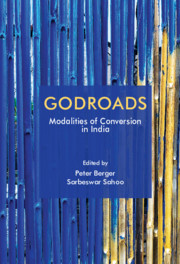Book contents
- Frontmatter
- Contents
- Foreword
- Acknowledgements
- Introduction
- 1 The Rise, Growth and Significance of Shudra Conversion Movements in the Methodist Mission, Hyderabad, 1925–1947
- 2 Communism and the Cross: A Caste–Class Trajectory of Religious Conversion in South India
- 3 Religious Conversion as Ethical Transformation: A Study of Islamic Reformism in Rural West Bengal
- 4 Conversion versus Unity: The Basel Mission among the Badaga on the Nilgiri Plateau, 1845–1915
- 5 Identity Change and the Construction of Difference: Colonial and Postcolonial Conversions among the Sumi Naga of Nagaland, Northeast India
- 6 Conversion to Christianity and Healing: The Naga of Northeast India
- 7 Reshaping the American Evangelical Conversion Narrative in Nineteenth-Century North India
- 8 Cultural Transformations through Performance Arts in Early Twentieth-Century South India
- 9 Reservation and Religious Freedom: Understanding Conversion and Hindu–Christian Conflict in Odisha and Rajasthan
- 10 Rupture and Resilience: Dynamics between a Hindu Reform Movement and an Indigenous Religion in Highland Odisha
- Afterword: India Seen from Amazonia
- About the Contributors
- Index
Introduction
Published online by Cambridge University Press: 24 April 2020
- Frontmatter
- Contents
- Foreword
- Acknowledgements
- Introduction
- 1 The Rise, Growth and Significance of Shudra Conversion Movements in the Methodist Mission, Hyderabad, 1925–1947
- 2 Communism and the Cross: A Caste–Class Trajectory of Religious Conversion in South India
- 3 Religious Conversion as Ethical Transformation: A Study of Islamic Reformism in Rural West Bengal
- 4 Conversion versus Unity: The Basel Mission among the Badaga on the Nilgiri Plateau, 1845–1915
- 5 Identity Change and the Construction of Difference: Colonial and Postcolonial Conversions among the Sumi Naga of Nagaland, Northeast India
- 6 Conversion to Christianity and Healing: The Naga of Northeast India
- 7 Reshaping the American Evangelical Conversion Narrative in Nineteenth-Century North India
- 8 Cultural Transformations through Performance Arts in Early Twentieth-Century South India
- 9 Reservation and Religious Freedom: Understanding Conversion and Hindu–Christian Conflict in Odisha and Rajasthan
- 10 Rupture and Resilience: Dynamics between a Hindu Reform Movement and an Indigenous Religion in Highland Odisha
- Afterword: India Seen from Amazonia
- About the Contributors
- Index
Summary
A road is only a simple thing at first sight, as has been previously noted (Miller 2001: 183). On second look, however, it reveals its dazzling complexity, as well as a profound and deep connection with human endeavours that it entails, for instance, with the human desire to escape from one place or to reach another. Movement, change and transformation are intrinsic to roads, to the experiencing subjects who travel along them and the environment they traverse, which they connect as much as divide. As the epitome of modernity, the road is a symbol of violence, colonialism, conquest, oppression and exploitation, as well as an icon of hope, protest and freedom.
Roads are connected to religion in manifold ways, not only in the sense that religions offer certain ‘paths’ to salvation (Sting 1997). Some of our readers and most of our authors will know what it feels like to be squeezed between narrow rows of a crowded bus in India, the vehicle coming to a sudden stop, the bus driver (or one of his team) jumping off to quickly offer a coconut at a small shrine on the side of the road, before diving back into the bus, hoping that the gods will hear him and give their blessing. Obviously, not only in India, but definitely there, roads are places of worship and of pilgrimage. They may represent ‘mythographies’ (Masquelier 2002), imaginations of an indigenised modernity which also involve ideas about the anger of those spirits whose dwellings have suffered destruction in the very construction of the road. They are also sites of reflection, a moral geography in relation to which loss of traditions and moral anomie can be contemplated (Luning 2009). They are liminal spaces and, as such, dying on the road – or rather on the path – may be considered a particularly ‘bad death’ (P. Berger 2015: 276f.). Being on the road may be associated with potential transgressions of embodied local moral orders and codes, and, as such, they may be a powerful tool restricting movement and reproducing asymmetrical relationships in terms of caste, class and gender (Miller 2001).
- Type
- Chapter
- Information
- GodroadsModalities of Conversion in India, pp. 1 - 46Publisher: Cambridge University PressPrint publication year: 2020



